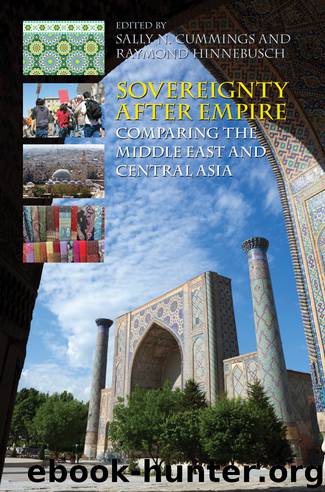Sovereignty After Empire: Comparing the Middle East and Central Asia by Unknown

Author:Unknown
Language: eng
Format: epub
Publisher: Edinburgh University Press
Published: 2012-09-10T16:00:00+00:00
After Empire?
Clearly, in order to make sense of the incident with the Samarkand Opera and Ballet Theater, and to understand issues of cultural sovereignty in post-Soviet Central Asia, we need a more complex understanding of the ways that the Soviet Union was and was not like a colonial empire. Applying the term “empire” to the Soviet Union has been the subject of much debate among scholars in the last ten years. In the early 1990s, the lively discussion in Western scholarship about the nation-building policies of the Soviet Union gradually evolved into a debate about whether or not the Soviet Union should be considered an empire. Historians have tended to focus on the early Soviet period, where the consolidation of Soviet power in Central Asia often played out in ethnic and cultural terms that were directly linked to, and often in opposition to, Tsarist imperial policies and attitudes. Social scientists, who focus more on the late and post-Soviet periods, have attended to the instrumental use of the term empire by Central Asian elites and the very messy realities on the ground that at times confirm and at times reject the utility of post-colonial theorizing about Central Asia.
The term empire has been invoked in many historical studies of early Soviet policies, especially those polices that aimed to build nations in the name of Soviet progress. These scholars have argued that the Soviet Union was an “affirmative action empire” or an “empire of nations” that used nationality as an organizing principle to foster various kinds of centrally controlled development. 9 Even though these policies were designed to build nations and modernize Central Asia, they perpetuated the kinds of cultural hierarchy and core–periphery differences that characterize modern empires. 10 However, these historians are also cautious about the applicability of the term empire to the USSR, pointing out that early Bolshevik policies were self-consciously anti-imperial, and that Soviet modernization policies were just as brutal on the Russian peasantry as on, say, Kyrgyz nomads. 11
Other historians reject outright the appellation empire as applied to Soviet Central Asia. Pointing to the important differences between the Soviet Union and other imperial powers of the twentieth century, Adeeb Khalid argues that the Soviet Union resembled an empire less than “a different kind of modern polity, the activist, interventionist, mobilizational state that seeks to sculpt its citizenry in an ideal image. [Conflating this kind of state with colonial empires] leads to a fundamental misunderstanding of modern history.” 12 Furthermore, as Marianne Kamp has argued, casting early Soviet history in a colonial light runs the risk of painting an overly polarized picture in which European colonizers battle native anti-colonial resistance. Rather, her work demonstrates that violence and upheaval in the early Soviet period was part of an ongoing struggle between traditionalists and the indigenous modernizers who made use of Soviet policies to carry out their ongoing, pre-Soviet agenda. 13 Those who violently opposed Soviet policies in early Soviet Central Asia “were not victims of Russian colonialism; they were agents who
Download
This site does not store any files on its server. We only index and link to content provided by other sites. Please contact the content providers to delete copyright contents if any and email us, we'll remove relevant links or contents immediately.
| Africa | Americas |
| Arctic & Antarctica | Asia |
| Australia & Oceania | Europe |
| Middle East | Russia |
| United States | World |
| Ancient Civilizations | Military |
| Historical Study & Educational Resources |
The Sympathizer by Viet Thanh Nguyen(4384)
The Rape of Nanking by Iris Chang(4202)
World without end by Ken Follett(3473)
Ants Among Elephants by Sujatha Gidla(3460)
Blood and Sand by Alex Von Tunzelmann(3194)
Japanese Design by Patricia J. Graham(3163)
The Queen of Nothing by Holly Black(2586)
City of Djinns: a year in Delhi by William Dalrymple(2547)
Foreign Devils on the Silk Road: The Search for the Lost Treasures of Central Asia by Peter Hopkirk(2454)
India's Ancient Past by R.S. Sharma(2450)
Inglorious Empire by Shashi Tharoor(2436)
Tokyo by Rob Goss(2427)
In Order to Live: A North Korean Girl's Journey to Freedom by Yeonmi Park(2377)
Tokyo Geek's Guide: Manga, Anime, Gaming, Cosplay, Toys, Idols & More - The Ultimate Guide to Japan's Otaku Culture by Simone Gianni(2360)
India's biggest cover-up by Dhar Anuj(2349)
The Great Game: On Secret Service in High Asia by Peter Hopkirk(2329)
Goodbye Madame Butterfly(2249)
Batik by Rudolf Smend(2179)
Living Silence in Burma by Christina Fink(2059)
